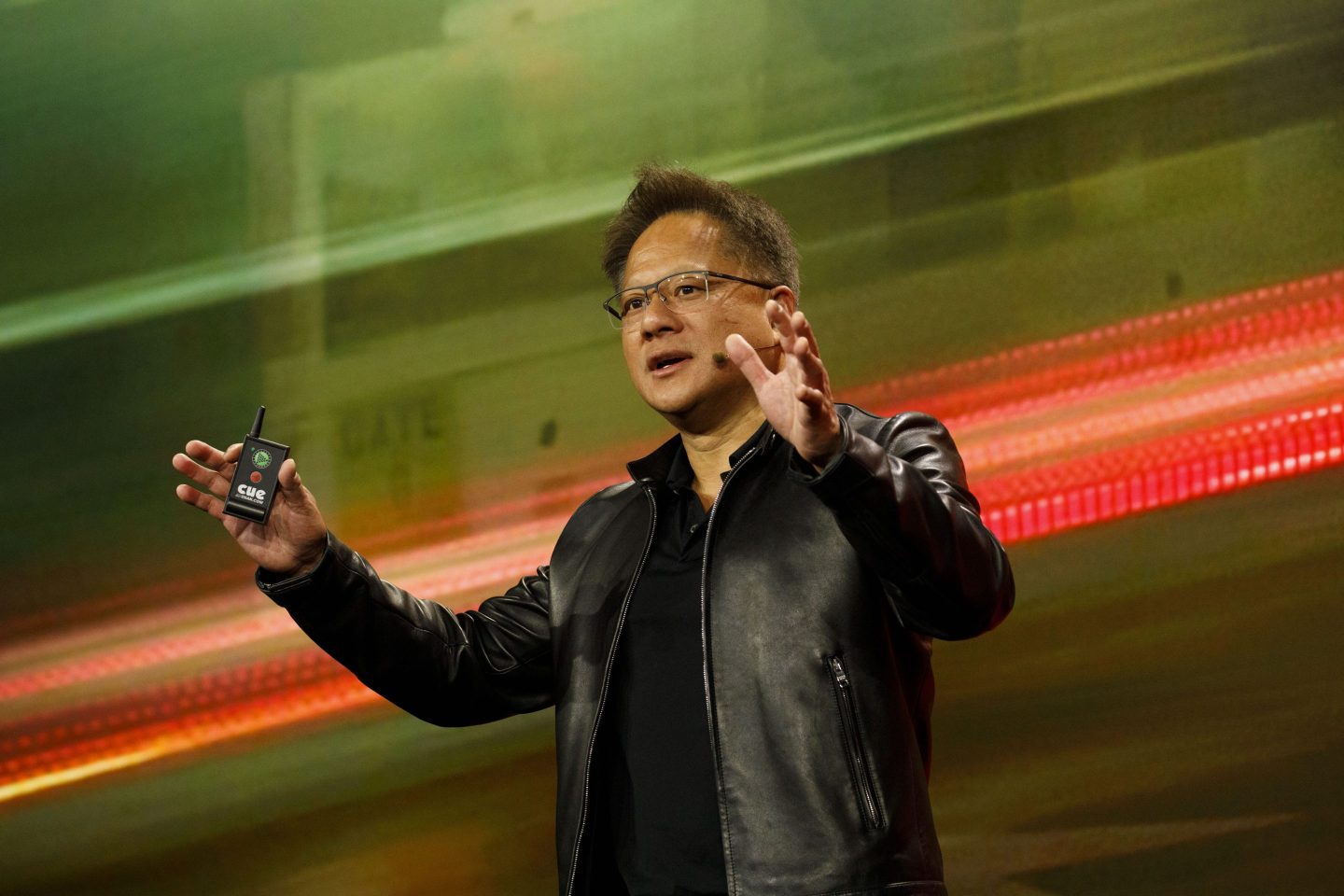
時機決定一切。近日,英偉達(Nvidia)CEO黃仁勛對應屆畢業生們表示,得益于人工智能帶來的機會,他們初入職場便迎來了一個偉大的時代。
加州芯片廠商英偉達(Nvidia)公布了遠超預期的季度銷售額,并且預測下一季度的銷售額將達到110億美元,超出分析師的預期50%以上。本周,英偉達的市值接近1萬億美元,將Meta、特斯拉(Tesla)和伯克希爾哈撒韋(Berkshire Hathaway)甩在身后。隨著數據中心紛紛致力于提高人工智能的能力,黃仁勛稱看到了“令人難以置信的訂單量”。
周六,黃仁勛在臺北國立臺灣大學(National Taiwan University)畢業典禮上發表了主題演講。他表示,他也是這一良好時機的受益者。黃仁勛在中國臺灣度過了一段童年時光,1984年畢業于俄勒岡州立大學(Oregon State University)。當時蘋果公司(Apple)發布了Macintosh,從而掀起了一場個人電腦革命。
他說道,1984年是一個“完美的畢業年份,我預測2023年也將是一個完美的畢業年份”。
他說道,畢業生邁入職場的時候,恰逢人工智能“從根本上徹底顛覆了計算。從各方面來看,這是電腦產業的再生契機,”
這位億萬富翁CEO繼續說道:“人工智能為我們帶來了巨大的機遇,反應敏捷的企業將利用人工智能技術提升競爭力,”而未能善用人工智能的企業將面臨衰退。他表示,畢業生們必須“學會利用人工智能的優勢,在人工智能的幫助下成就驚人業績。”
他表示,人工智能將創造“以前不存在的新工作機會”,例如提示詞工程師、人工智能工廠運營和人工智能安全工程師等。他承認,自動化會令一些工作崗位消失,但他表示,有人擔心人工智能可能搶走他們的工作,但實際上他們可能被更擅長使用人工智能的人們所取代。
黃仁勛呼吁畢業生們“能謙卑地面對失敗,承認錯誤”,并告誡他們要“承受痛楚和苦難”。他分享了在英偉達創業早期,他經歷過的“令人恥辱和尷尬”的失敗。例如,英偉達一度意識到,“從技術上不合格的”架構是“錯誤的策略”,但它已經獲得了Sega的合同,需要使用這種架構幫助Sega開發一款新游戲機。
他解釋稱:“我們必須停下來。但我需要Sega全額付款,否則英偉達就要破產。我很難為情地向Sega CEO提出了這個要求。”但令他驚訝的事,Sega CEO同意了他的要求,讓英偉達“存活六個月”。
英偉達確實存活了下來,還成為游戲行業的主要參與者,現在成為人工智能領域的領軍者。
黃仁勛呼吁,隨著人工智能時代的降臨,畢業生們應該“像我們一樣全力以赴去追求它。努力奔跑吧!別猶豫。”(財富中文網)
翻譯:劉進龍
審校:汪皓
時機決定一切。近日,英偉達(Nvidia)CEO黃仁勛對應屆畢業生們表示,得益于人工智能帶來的機會,他們初入職場便迎來了一個偉大的時代。
加州芯片廠商英偉達(Nvidia)公布了遠超預期的季度銷售額,并且預測下一季度的銷售額將達到110億美元,超出分析師的預期50%以上。本周,英偉達的市值接近1萬億美元,將Meta、特斯拉(Tesla)和伯克希爾哈撒韋(Berkshire Hathaway)甩在身后。隨著數據中心紛紛致力于提高人工智能的能力,黃仁勛稱看到了“令人難以置信的訂單量”。
周六,黃仁勛在臺北國立臺灣大學(National Taiwan University)畢業典禮上發表了主題演講。他表示,他也是這一良好時機的受益者。黃仁勛在中國臺灣度過了一段童年時光,1984年畢業于俄勒岡州立大學(Oregon State University)。當時蘋果公司(Apple)發布了Macintosh,從而掀起了一場個人電腦革命。
他說道,1984年是一個“完美的畢業年份,我預測2023年也將是一個完美的畢業年份”。
他說道,畢業生邁入職場的時候,恰逢人工智能“從根本上徹底顛覆了計算。從各方面來看,這是電腦產業的再生契機,”
這位億萬富翁CEO繼續說道:“人工智能為我們帶來了巨大的機遇,反應敏捷的企業將利用人工智能技術提升競爭力,”而未能善用人工智能的企業將面臨衰退。他表示,畢業生們必須“學會利用人工智能的優勢,在人工智能的幫助下成就驚人業績。”
他表示,人工智能將創造“以前不存在的新工作機會”,例如提示詞工程師、人工智能工廠運營和人工智能安全工程師等。他承認,自動化會令一些工作崗位消失,但他表示,有人擔心人工智能可能搶走他們的工作,但實際上他們可能被更擅長使用人工智能的人們所取代。
黃仁勛呼吁畢業生們“能謙卑地面對失敗,承認錯誤”,并告誡他們要“承受痛楚和苦難”。他分享了在英偉達創業早期,他經歷過的“令人恥辱和尷尬”的失敗。例如,英偉達一度意識到,“從技術上不合格的”架構是“錯誤的策略”,但它已經獲得了Sega的合同,需要使用這種架構幫助Sega開發一款新游戲機。
他解釋稱:“我們必須停下來。但我需要Sega全額付款,否則英偉達就要破產。我很難為情地向Sega CEO提出了這個要求。”但令他驚訝的事,Sega CEO同意了他的要求,讓英偉達“存活六個月”。
英偉達確實存活了下來,還成為游戲行業的主要參與者,現在成為人工智能領域的領軍者。
黃仁勛呼吁,隨著人工智能時代的降臨,畢業生們應該“像我們一樣全力以赴去追求它。努力奔跑吧!別猶豫。”(財富中文網)
翻譯:劉進龍
審校:汪皓
Timing is everything. Nvidia CEO Jensen Huang told graduates this weekend that, thanks to opportunities in artificial intelligence, they are starting their careers at a great time.
Nvidia’s market cap neared $1 trillion this week—leaving the likes of Meta, Tesla, and Berkshire Hathaway in the dust—after the California-based chipmaker reported a stronger-than-expected quarter and forecast sales of $11 billion in the coming quarter, over 50% higher than what analysts expected. Huang described “incredible orders” as data centers looked to become A.I. capable.
On Saturday in Taipei, in a keynote speech at National Taiwan University’s commencement ceremony, Huang said that he, too, benefited from good timing. After spending part of his childhood in Taiwan, he graduated from Oregon State University in 1984, when the debut of the Apple Macintosh helped spark a revolution in personal computing.
1984 was a “perfect year to graduate,” he said, “and I predict that 2023 will be as well.”
In 2023, he continued, graduates will join the workforce just as A.I. has “reinvented computing from the ground up. In every way this is the rebirth of the computer industry.”
“A.I. has opened immense opportunities,” the billionaire CEO continued. “Agile companies will take advantage of A.I. and boost their position,” while firms that don’t will perish. Graduates must “take advantage of A.I. and do amazing things with an A.I. copilot by your side,” he added.
A.I. will create “new jobs that didn’t exist before,” such as prompt engineering, A.I. factory operations, and A.I. safety engineers, he said. He acknowledged that some jobs will be lost to automation, but added that while people fret about losing their job to A.I., they might actually lose it to someone who’s become more expert at using A.I.
Huang urged graduates to “have the humility to confront failure and admit a mistake,” telling them they would “endure pain and suffering.” He described “humiliating and embarrassing” failures he suffered in Nvidia’s early days. For example, Nvidia realized at one point that its “technically poor” architecture was the “wrong strategy,” but it had already won a contract with Sega to help make a new gaming console using it.
“We had to stop, but I needed Sega to pay us in whole or Nvidia would be out of business. I was embarrassed to ask,” he explained, but to his amazement Sega’s CEO agreed, giving Nvidia “six months to survive.”
Nvidia did survive, becoming a key player first in the gaming industry and now in artificial intelligence.
With the A.I. era here, Huang urged graduates to “run after it like we did. Run, don’t walk.”






